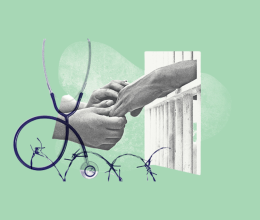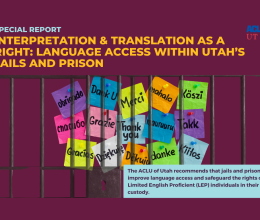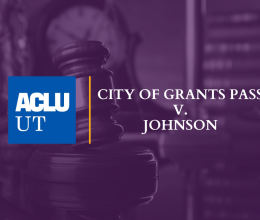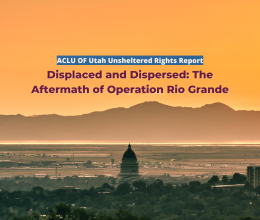
For months now, responsible elected officials and earnest public servants have been speaking the encouraging language of criminal justice reform: "evidence-based practices"...."doing what works"...."making policy based on facts, not emotion."
There is growing recognition across the political spectrum that there are too many mentally ill people cycling in and out of jail, too many people in prison who really just need substance abuse treatment, too many new felonies created each year by the state legislature.
And then, just when you're feeling hopeful, something like this happens.
Yes, gang violence is a serious problem. Usually, it is most serious for the men and women who are trapped in gang life, but it's also a serious problem for the community members and law enforcement officers who encounter it. Certainly, gang issues deserve our attention.
Our careful, data-driven, constitutionally-sensitive, non-panicky attention.
What we do not need - especially when Utah is on the verge of making real progress in reducing our prison population and solving our serious recidivism problem - is to encourage law enforcement to overreact to community safety issues in ways that threaten civil liberties and perpetuate mass incarceration.
I'm not saying that Utahns shouldn't be concerned about "outlaw motorcycle gangs." (However, when Sgt. Lane Critser says that these gangs' presence has "increased by 300% in five years," his comments should be understood in the context of Utah law enforcement's extremely low threshold for categorizing individuals as "gang members.")
I am saying that Utans should be very concerned about this segment from Marjorie Cortez's excellent Deseret News story:
"Rep. Curtis Oda, R-Clearfield, said state lawmakers may want to revisit the gang injunction used by Weber County until it was thrown out of court. The Utah Supreme Court threw out the injunction ruling that the county did not properly serve summons to gang members. "This is the same law that California had for nearly two decades, and their Supreme Court said it was fine. And our Supreme Court says we have a problem with this? It was starting to work," Oda said. He said the state should retool the injunction addressing the court's concerns, then attempt to apply it statewide."
Ogden's gang injunction was not the "same law" used in California - the injunctions enacted in various California cities typically cover small geographic areas and, at most, a few dozen alleged gang members. Ogden's injunction attempted to restrain the activities of hundreds of individuals, everywhere within Ogden's city limits. The threshold for inclusion in Weber County's mysterious "gang database" is apparently quite low (be careful if you are Latino and a Mehmet Okur fan!).
Note: For a great rundown on the serious civil liberties implications of Ogden's injunction, I highly recommend this forum hosted and filmed by Weber State University in 2010. It's about an hour long, but well worth the watch!
The injunctions used in California have been challenged and protested by civil rights groups, too. And not all California courts agree that they are constitutional. Rep. Oda might want to read about this injunction that was denied in Santa Barbara recently, for all the right reasons.
The complaints about so-called "gang injunctions" are many:
- they cost too much, and divert funding from youth social programs that focus on prevention;
- they focus even more negative police attention on young men of color, without seeking to address the larger issues that lead to gang involvement;
- they criminalize otherwise legal behavior, thereby contributing to (even exacerbating) our nation's mass incarceration of young men of color; and
- rather than actually decrease gang violence, they appear to simply push gang activity into other areas (and usually only for a limited time).
But perhaps most importantly, they perpetuate the myth that we can arrest our way out of the problem of gang violence - or out of any public safety problem, for that matter.
One of the greatest failings of Utah's current Justice Reinvestment work in partnership with the Pew Public Safety Performance Project is that the reform process completely ignores the role that law enforcement tactics and attitudes play in driving our prison and jail populations.
Evidence-based practices in criminal justice are all well and good, but not so much when they are used only to improve the system post-adjudication. That means we are trying to solve the problems of our criminal justice system by focusing only on the activities that take place within that system after someone is arrested and charged with a crime. We could accomplish so much more by also examining the practices that bring people to court - or even just into the backs of police cruisers - in the first place.
It is unfortunate that law enforcement practices, community surveillance and school discipline are not part of Utah's current reform conversation. It is at these early junctures that so many people are being swept into - and kept in - the criminal justice pipeline.
At the very least, while Utah is actively engaged in sincere efforts to start to clean up its system, we can reject ill-informed, fear-based efforts to arrest our way out of the complicated social, economic and racial problems facing our shared communities.





